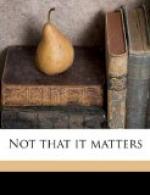The subject for essay has frequently been given, “If a million pounds were left to you, how could you do most good with it?” Some say they would endow hospitals, some that they would establish almshouses; there may even be some who would go as far as to build half a Dreadnought. But there would be a more decisive way of doing good than any of these. You might refuse the million pounds. That would be a shock to the systems of the comfortable —a blow struck at the great Money God which would make it totter; a thrust in defence of pride and freedom such as had not been seen before. That would be a moral tonic more needed than all the draughts of your newly endowed hospitals. Will it ever be administered? Well, perhaps when the D.W.T. club has grown a little stronger.
Have you heard of the D.W.T.—the Declined- with-Thanks Club? There are no club rooms and not many members, but the balance sheet for the last twelve months is wonderful, showing that more than 11,000 was refused. The entrance fee is one hundred guineas and the annual subscription fifty guineas; that is to say, you must have refused a hundred guineas before you can be elected, and you are expected to refuse another fifty guineas a year while you retain membership. It is possible also to compound with a life refusal, but the sum is not fixed, and remains at the discretion of the committee.
Baines is a life member. He saved an old lady from being run over by a motor bus some years ago, and when she died she left him a legacy of 1000. Baines wrote to the executors and pointed out that he did not go about dragging persons from beneath motor buses as a profession; that, if she had offered him 1000 at the time, he would have refused it, not being in the habit of accepting money from strangers, still less from women; and that he did not see that the fact of the money being offered two years later in a will made the slightest difference. Baines was earning 300 a year at this time, and had a wife and four children, but he will not admit that he did anything at all out of the common.
The case of Sedley comes up for consideration at the next committee meeting. Sedley’s rich uncle, a cantankerous old man, insulted him grossly; there was a quarrel; and the old man left, vowing to revenge himself by disinheriting his nephew and bequeathing his money to a cats’ home. He died on his way to his solicitors, and Sedley was told of his good fortune in good legal English. He replied, “What on earth do you take me for? I wouldn’t touch a penny. Give it to the cats’ home or any blessed thing you like.” Sedley, of course, will be elected as an ordinary member, but as there is a strong feeling on the committee that no decent man could have done anything else, his election as a life member is improbable.




